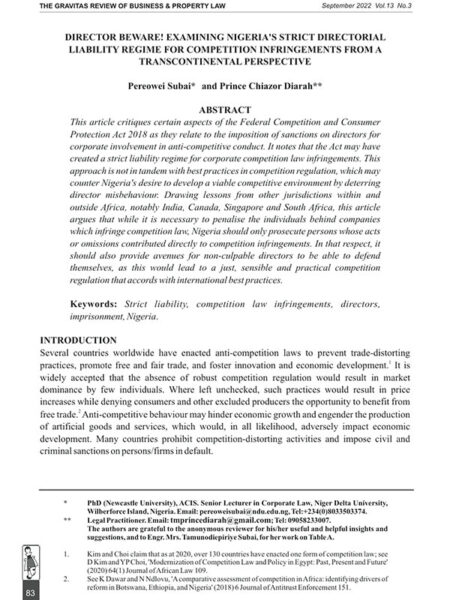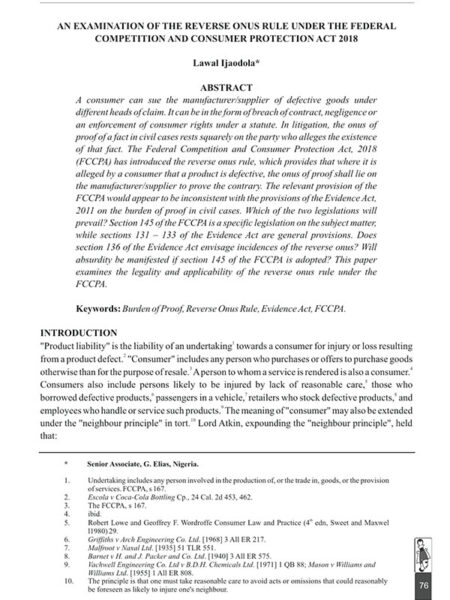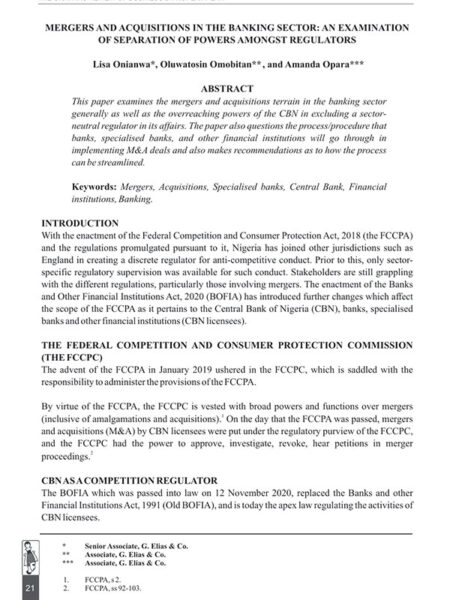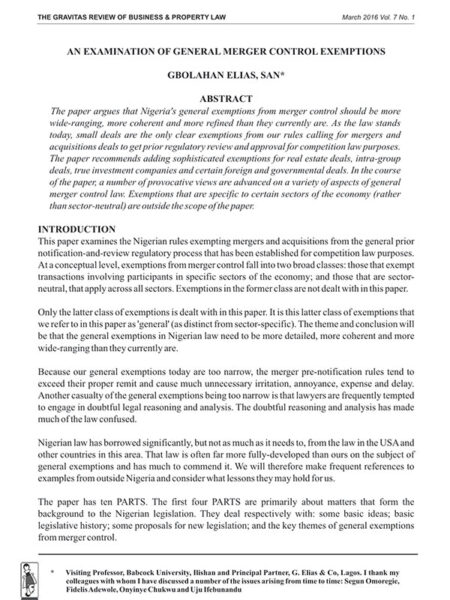-

Director Beware! Examining Nigeria’s Strict Directorial Liability Regime for Competition Infringements from a Transcontinental Perspective
0₦2,500.00Dr Pereowei Subai, Senior Lecturer in Corporate Law at the Niger Delta University, Wilberforce Island, Nigeria and Prince Chiazor Diarah in their article, Director Beware! Examining Nigeria’s Strict Directorial Liability Regime for Competition Infringements from a Transcontinental Perspective, critique certain aspects of the Federal Competition and Consumer Protection Act 2018 (FCCPA) as they relate to the imposition of sanctions on directors for corporate involvement in anticompetitive conduct. They note that the FCCPA seems to have created a strict liability regime for corporate competition law infringements. This approach is not in tandem with best practices in competition regulation which may be counterproductive to Nigeria’s desire to develop a viable competitive environment by deterring directors’ misbehaviour. Drawing lessons from other jurisdictions within and outside Africa, the authors argue that while it is necessary to penalise the individuals behind companies which infringe competition law, Nigeria should only prosecute persons whose acts or omissions contributed directly to competition infringements.
-

An Examination of The Reverse Onus Rule Under the Federal Competition and Consumer Protection Act 2018
0₦2,500.00Lawal Ijaodola, Senior Associate, G. Elias, in his article, An Examination of The Reverse Onus Rule Under the Federal Competition and Consumer Protection Act 2018, notes that a consumer can sue the manufacturer/supplier of defective goods under different causes of action. It can be in breach of contract, negligence, or an enforcement of consumer rights under a statute. In litigation, the onus of proof of a fact in civil cases rests squarely on the party who alleges the existence of that fact. The Federal Competition and Consumer Protection Act 2018 (FCCPA) has introduced the reverse onus rule, which provides that where it is alleged by a consumer that a product is defective, the onus of proof shall lie on the manufacturer/supplier to prove that the product is not defective. The relevant provision of the FCCPA would appear to be inconsistent with the provisions of the Evidence Act 2011 on the burden of proof in civil cases. Which of the two laws will prevail? Section 145 of the FCCPA is a specific legislation on the subject matter, while sections 131 – 133 of the Evidence Act are general provisions. Does section 136 of the Evidence Act envisage incidences of the reverse onus? Will absurdity be manifested if section 145 of the FCCPA is adopted? Lawal examines the contending issues and the legality and applicability of the reverse onus rule under the FCCPA.
-

Mergers and Acquisitions in the Banking Sector: An Examination of Separation of Powers Amongst Regulators
0₦2,500.00Lisa Onianwa, Oluwatosin Omobitan, and Amanda Opara, all of G. Elias & Co, in their article, Mergers and Acquisitions in the Banking Sector: An Examination of Separation of Powers Amongst Regulators, examine the mergers and acquisitions (M&A) terrain in the banking sector and the overreaching powers of the Central Bank of Nigeria (CBN) in excluding a sector-neutral regulator in M&A deals. Onianwa et al. question the process and procedure that banks and other financial institutions implement in M&A deals and make recommendations on how the process can be streamlined.
-

An Examination of General Merger Control Exemptions
0₦2,500.00Professor Gbolahan Elias, SAN, Principal, G.E. Elias & Co in this monumental work “An Examination of General Merger Control Exemptions” analyses the state of Nigerian law with regards to preview and review in cases of mergers, acquisitions and business combinations. He argues that as the law stands, small deals are the only clear exemption from our rules calling for mergers and acquisitions deals to get prior regulatory review and approval for competition law purposes. Drawing on international comparison, the paper argues that the holding company exemption provided for in the Investments and Securities Act is questionable and advocated the need to add exemptions for real estate deals, intra-group deals, investment companies and certain foreign and governmental deals.
The Gravitas Review of Business & Property Law



